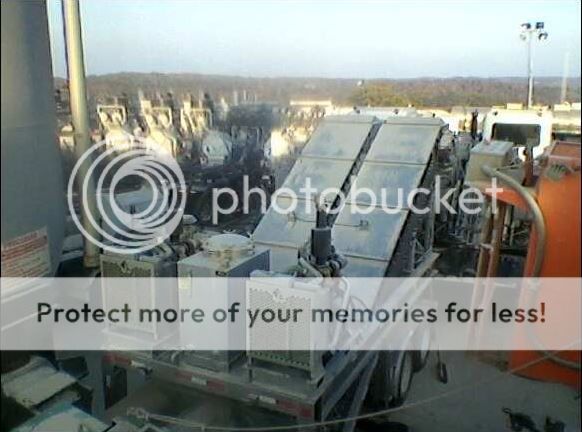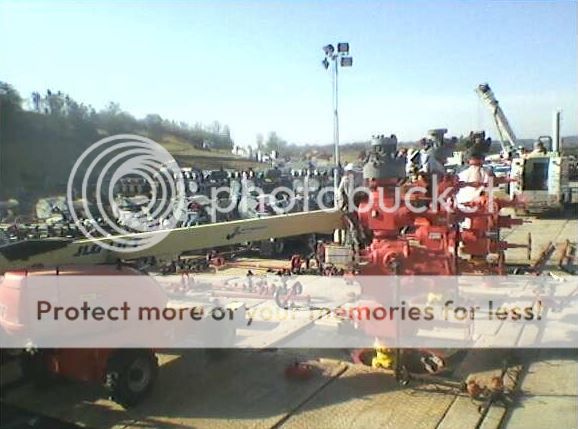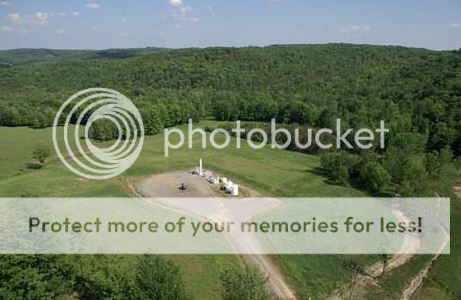After 500,000 miles as an over-the-road truck driver, I have
taken on a new job.
I have become a Sandworm.
It's kind of an odd title for what I do, I suppose. My
job consists of several tasks, and only one of them is actually tending the
sand hopper. But as a newbie to the company, I'm still a worm, as the oilfield phrasing
goes. So "sandworm" has a certain satisfactory ring to it, and it
makes me laugh. But more specifically, I'm now working for a well completion
company based only 14 miles from my house. In the vernacular, I frac gas wells.
"Fraccing," as it's called, is a technique for
increasing the productivity of shale gas reservoirs, and is responsible for
economic booms in several oil-producing regions in the United States, most
specifically, Right Where I Live, in eastern Ohio. "Hydraulic
fracturing" involves starting with a pre-drilled well and then pumping
down a slurry of sand, water, and chemicals under immense pressure. The
pressurized fluid travels down the well casing and emerges through perforations
into the reservoir rock some eight to ten thousand feet below the surface, along
a horizontal well bore some five or ten thousand feet more. As it enters the
formation, the pressure opens small fissures, which are propped open by the
sand being carried in. When the pressure is relieved and the well allowed to
flow back into catch tanks on the surface, the cracks remain open, allowing oil
and natural gas to bubble back up the well bore to be recovered at the surface
and piped to a refinery.
The newbie job at a well pad is to tend the sand hopper,
which is a big steel tub into which the sand is dumped from a conveyor belt.
The job is very simple, and very important. The slurry being pumped into the
well is pressurized to as much as 10,000 psi. If the sand hopper is allowed to
empty completely through error or inattention, the pressure in the above-ground
steel pipes spikes and may cause them to rupture or explode. Believe me,
hundred-pound sections of steel pipe flying through the air high above a
congested work site will get your attention real quick. Even if the pipe
doesn't break loose, a stream of water at that pressure can cut through your
leg like a knife. To keep people safe, nobody is allowed to walk around near
the iron when it's under pressure, except one or two crew members specifically
assigned to look for problems. That's fine with me.
There's a lot of controversy about hydraulic fracturing
right now, and a lot of people trying to come to grips with a technology about
which they know relatively little, and sometimes about which they have been
deceived by various factions on both sides of the issue. Fraccing has been
blamed for earthquakes, groundwater pollution, excessive truck traffic and road
wear, environmental spills, noise and light pollution, and so on. Some of these
issues are genuine and should be addressed. Some are not, and are the product
of misinformation, ignorance, and occasionally outright deception. While we're
thinking about it, though, it's important to remember that the process has been
a part of American oil field practices for some fifty years, and is one of the
chief means that our 21st century lifestyle is allowed to continue. By 21st
century lifestyle, I'm talking about those things that we all take for granted:
heat, light, transportation, and plastics, all of which depend on natural gas
and oil wells.
Just as an aside, the oil fields aren't new to me. I'm from
Oklahoma, and the farm my great-grandfather plowed behind a pair of mules was
home to four oil wells during the time I spent there. The hollow thumping of
the casing head gas engines driving the slowly-bobbing pumpjacks is an inseparable
part of my childhood memories of the farm where three generations of my family
were born and grew up. My father was an operations geologist, and would take me
along on his route from well to well, where I would kick my heels from the steel
bench in the doghouse, a few yards from the roaring Caterpillars and the
swinging stands of drill pipe. As a teenager, my first real summer jobs were as
a roustabout on drill ships anchored off the coast of Borneo. During college, I
worked in the Gulf of Mexico and sunny Caribbean
Sea on seismograph boats doing both streamer work and backdown drag. One summer
I spent in Custer County, Oklahoma, stomping geophones for a doodlebugger crew
that still used dynamite as a sonic source, rather than the modern vibro-seis
trucks. And my first job out of graduate school was as an operations geologist
with Exxon Corporation in West Texas, where I worked with mudloggers and
wireline crews to pick core points and evaluate reservoir potential in Permian
Basin wildcats.
It's been a long and circuitous journey from then to now,
but still, the oil fields and their culture are familiar and unmysterious to me.
So I'm somewhat bemused by the hostility and fear that the process of well
drilling seems to instill in many people, especially when they depend so
heavily on its products for their own lifestyle choices. Obviously oil and gas are limited resources, and equally obviously there is going to have to be a
transition from them to other sources of energy such as solar, wind, tidal,
geothermal, and likely as not, nuclear. But until then we're stuck with what we
have, and I believe we should use the extra time made available to us by the
current shale gas developments to make these alternative sources a reality for
more of us than just the editors of Popular Science. And of course the vast dependence
of our culture on the availability of inexpensive plastics—which come from oil
and gas wells—is seldom given the airing that it needs in this discussion.
Plastics, industrial chemicals and lubricants, fertilizer, and pharmaceuticals
are the elephant in this room that still has to be acknowledged.
These decisions came into focus recently when my Yearly
Meeting decided to decline the offers made to it to lease oil and gas rights
under the 270 acres it owns in Ohio. This decision was made during a called
meeting of Yearly Meeting members, and all the points were given a chance to be
aired, both for and against the question. In the end, the decision was made in
unity, although what exactly that unity consisted of is still somewhat fuzzy.
But made it we did, and we now have a responsibility to act upon that decision
and become a part of the future that we chose to embrace.
What that action will be is problematic. I and the other
members of my meeting heat our houses with oil and gas. We light our homes with
oil and gas. We drive to and from meeting using oil and gas. And I'm typing
these words on a computer made from oil and gas, using a desk lamp made from
oil and gas, while in my kitchen my dinner is being cooked using oil and gas.
As Friends, what shall be our witness about oil and gas development? Are we
justified in refusing to be a part of the oil and gas development in our own neighborhoods,
while remaining active consumers of the oil and gas produced in
the neighborhoods of others?
To my way of thinking, this is an extremely important point
that many Friends seem to push under the carpet. Remember John Woolman, that
18th century Quaker who rejected slavery and worked hard to make the rest of
the Society of Friends do the same? Woolman provides an important example of
how to make one's profession match one's practice. Not only did Woolman pioneer
for the rejection of slavery, he refused to accept the economic benefits that
slavery made possible. As a merchant clerk, Woolman refused to accept payment
for writing a bill of sale that included ownership of a negro slave. Later, he sacrificed
business opportunities and refused to write wills that listed slaves as
property. When he travelled in the ministry among slave-owning Friends, he
would pay the slaves for their services in attending him. Woolman even refused
to eat from silver plates and cups, as he believed that slaves were abused in
mining.
What should be our own witness in this matter? For myself,
the question is moot, as I personally support oil and gas development so long
as we are simultaneously working towards sustainable alternatives. I am slowly
introducing solar illumination to my own home, and will eventually install wind
turbines. Our newly-drilled water well will use an electric pump at first, but
eventually I plan to install a windmill and an elevated water tank to supply
our house. Our household heat was formerly lump coal, is currently electric,
but may eventually use our fifteen acres of hardwoods as a sustainable source
for an outside boiler. In other words, I'm trying to be a forward-looking part
of the solution, at least with respect to energy.
But as part of the larger culture, what should the witness
of the Society of Friends be? If we are against oil and gas development, how
can we reconcile our profession with our practice? If we support it, what are
we doing to transition our use to sustainable sources before we are driven to
it by scarcity and price? And since so much of our foreign policy is driven by involvement
in the oil and gas-producing regions of the world, how do we reconcile our
views of oil and gas production with our beliefs about our political activities
there?
The questions are important ones, and the answers aren't
easy. But in the meantime, I'm home every night now, and my houseful of kids
now has a father that they see a lot more often than when he was driving a
truck 25 days out of thirty. So for me, the 14-hour workdays are worth it. But
I'm concerned about the bigger picture, and I'm equally concerned that the Religious
Society of Friends provide a witness to a forward thinking part of a solution,
rather than to a self-centered and selfish part of the problem.
So far the solution to that dilemma is in doubt.









